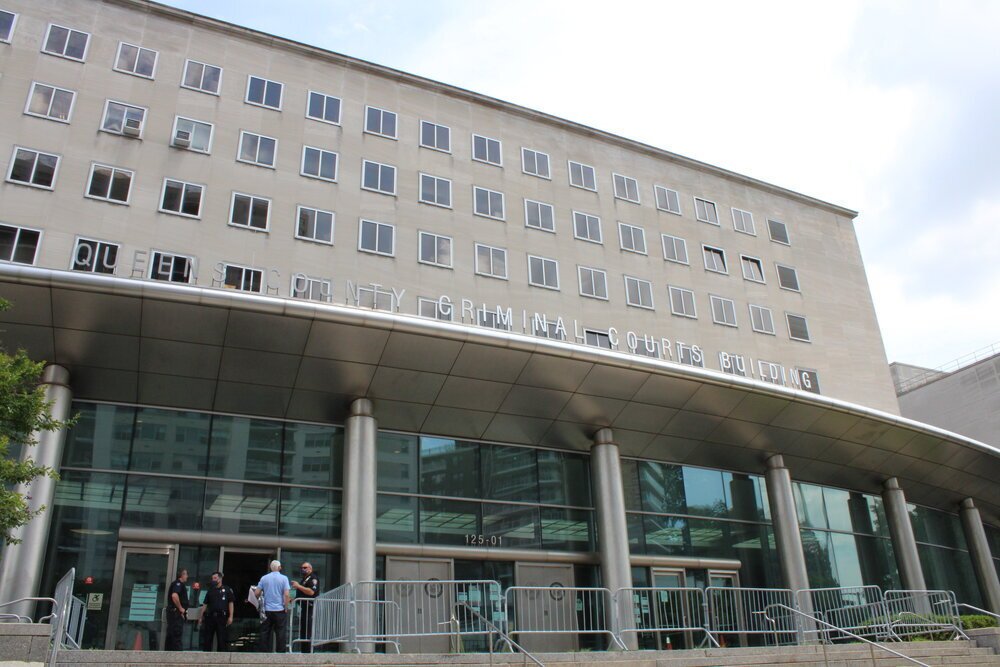Letters unsealed in law professor’s case against Katz
/A U.S. district judge ruled several letters the city sought to keep confidential be unsealed in a case a group of law professors have brought against Queens District Attorney Melinda Katz and the city. Eagle file photo by David Brand
Last year, when a group of law professors made public a number of complaints against current and former prosecutors in the Queens District Attorney’s office, the city’s lawyer wrote a number of state grievance committees and alleged the professors violated the confidential process.
In the letters, then-Corporation Counsel James Johnson accused the professors of misconduct themselves, the law professors say.
When the professors, who are part of the nonprofit groups Civil Rights Corps and Accountability NY, whose mission is to hold prosecutors in the state accountable for misconduct, filed a lawsuit against the city and Queens District Attorney Melinda Katz alleging their First Amendment rights had been infringed upon, Johnson sought to keep his letters confidential.
That has been the case until recently, when a federal judge ruled that the letters, submitted as part of the law professor’s initial complaint, be made public.
U.S. District Judge Victor Marrero made the ruling last week, and unsealed the letters that are at the heart of the professor’s suit against the city and Katz.
“While the letters are surely embarrassing to the Corporation Counsel and the Queens District
Attorney, they disclose nothing that can remotely be thought to be confidential,” the law professors said in their lawsuit. “There is no legitimate governmental interest in keeping such letters confidential.”
The law professors allege that Johnson’s letters influenced the various grievance committees’ decisions to investigate the allegations of prosecutorial misconduct against 21 current and former Queens assistant district attorneys.
“[This letter] was trying to interfere with [the grievance committees’] process, I think successfully,” Cynthia Godshoe, a professor at Brooklyn Law School and plaintiff in the lawsuit, told the Eagle.
In May 2021, Civil Rights Corps sent the complaints of misconduct – all of which had been made against ADAs in previous, public judicial rulings – to the state’s grievance committees, while also publishing the complaints on their website, Accountability NY.
Seeking to shed light on the opaque grievance process, the professors wanted there “to be repercussions for that misconduct, not for its own sake, but so that it will stop happening, and so defendants will be treated fairly and people won't be wrongfully convicted,” Justin Murray, a professor at New York Law School who signed onto the lawsuit, told the Eagle in November.
The grievance process is almost entirely confidential – grievance committees do not share the status of their investigations, or even if an investigation has been initiated against a prosecutor. The only time a complaint is made public is if the committee recommends discipline, which rarely happens, according to the professors.
The professors argue that because the allegations of misconduct were already public, having been made previously in judicial proceedings, they weren’t in violation of the grievance process.
However, Johnson, in his letters, claimed that “the very public campaign surrounding this and other similar complaints is contrary to both the law and the principles on which the grievance process is based.”
“As your office reviews this complaint, I respectfully request that your Committee consider the manner in which it was filed,” Johnson wrote in a letter dated June 2, 2021, his last month in office.
At the end of his letter, Johnson wrote, “to be clear, in sending this letter I am taking no position on the substance of the allegations involving the individual ADAs.”
In response to Johnson’s letter, Diana Maxfield Kearse, the chief counsel for the Grievance Committee for the Second, Eleventh and Thirteenth Judicial Districts, wrote to the professors and said that the complaints had been received sua sponte – a legal term that suggests the committee became aware of the complaints without prompting from the professors.
“The Law Professors interpreted the Kearse letter as their dismissal from the Grievance Complaints and a denial of their ‘complainant’ status,” Marrero wrote in his decision. “They also believe the Johnson Letter was the impetus for the Kearse Letter, as Plaintiffs allege the Johnson Letter was sent in retaliation for their publishing the Grievance Complaints and the Kearse Letter notified them of adverse action taken upon Kearse’s receipt of the Johnson Letter.”
After a few other letters were sent back and forth, the professors sued the city and Katz for what they say was a violation of their First Amendment rights.
“Our position is that we actually have constitutionally protected free speech rights to put this information in the public realm, especially considering that we're not relying on any private facts,” Murray said in November.
Though the professors say they plan on publishing complaints against prosecutors throughout the state, they started with Queens because there had recently been a number of high profile allegations of misconduct made public.
In March, Queens District Attorney Melinda Katz’s Conviction Integrity Unit filed a motion to vacate the convictions of Gary Johnson, George Bell and Rohan Bolt. The three men had been wrongfully convicted in the 1996 murder of an off-duty police officer and a business owner.
Though the CIU did not accuse then-Assistant District Attorney Brad Leventhal of prosecutorial misconduct, then-Queens Supreme Court Administrative Judge Joseph Zayas, who granted the motion, felt differently.
“The stakes could not have been higher and the duty of care by the prosecution should have been correspondingly heightened,” Zayas said during the hearing. “The opposite occurred in this case … the District Attorney’s office deliberately withheld from the defense credible information about third-party guilt that is evidence that others may have committed these crimes.”
It’s unclear whether or not Leventhal’s alleged misconduct was investigated by a grievance committee. The former prosecutor resigned several weeks after Zayas’ ruling.
In a statement to the Eagle, Law Department spokesperson Nick Paolucci said, “We respect the court’s ruling.”




